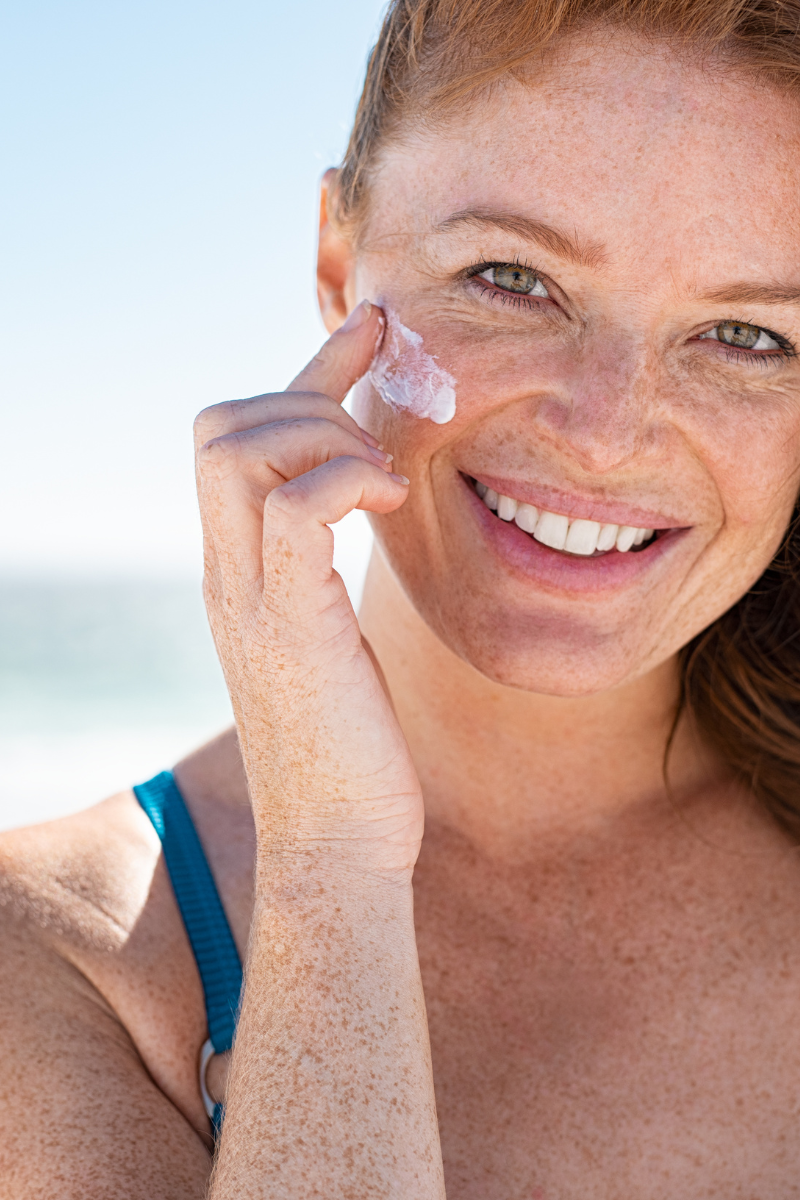Thought all sunscreens were made equal? Think again. Mineral sunscreens are your best bet against sun damage, premature aging and skin cancer. If you have tried mineral sunscreen before and ended up hating the whitish cast, try it again, the new formulations are better than ever.
What is mineral sunscreen?
Since ultraviolet radiation is the biggest cause of melanoma, the use of sunscreen to filter UV rays has become a daily necessity but what kind of sunscreen should you use? Conventional chemical sunscreens used to be premium in the sun-care market because they were smooth lightweight formulations which absorbed right into the skin. All that has changed with the ever evolving technology of mineral sunscreen which reflects those ultraviolet rays. Remember beauty care is a multi billion dollar industry (per year!) and the technology of products keeps getting better and better. With new and improved formulas, both big and small skin-care brands are jumping on the mineral sunscreen bandwagon. Here are five sun-sational reasons why it’s time to give mineral sunscreen a shot.
- Mineral sunscreen provides protection against the full spectrum of ultraviolet radiation.
Chemical sunscreens contain filters that protect against UVB radiation, the type of wavelength that damages the superficial layers of the skin and causes sunburns (UVB= Burns). Mineral sunscreens (zinc oxide and titanium dioxide) protect against UVA as well, which is the wavelength that penetrates clouds and glass and causes significant photo-aging in the form of wrinkles and sun spots (UVA= Aging). This is why you can get sun exposure on a cloudy day or thru a window, making it so important to include sunscreen in your daily skin care routine. When picking up a bottle of mineral sunscreen, look for the words “full spectrum” or “broad spectrum.” This label means that the product screens both UVB and UVA radiation. Make sure you choose a minimum of SPF 30.
- Mineral sunscreen is less likely to irritate sensitive skin.
Mineral sunscreens are generally well-tolerated by sensitive skin because their ingredients aren’t absorbed into the skin itself. Instead, the physical filters in mineral sunscreens sit on the surface of the skin and act as a screen that deflects UV radiation. Chemical sunscreens, on the other hand, can cause a skin reaction because their ingredients are micro enough to penetrate the epidermis. This is a big difference in sunscreen types and why it’s important to reapply if you are sweating or in water.
- Mineral sunscreen starts protecting your skin immediately after application.
Remember the old school rule of waiting to get out to the pool? Chemical sunscreens need to be absorbed into the skin, which can take 20 to 30 minutes. You will have to wait to avoid sunburns or sun damage. Mineral sunscreens protect the skin by physically deflecting the sun’s rays, which means they’re effective as soon as they’re applied. Meaning you can apply and go go go!
- Mineral sunscreen melts into the skin just as much as a chemical one.
I’ll say it again for the people in the back: the beauty industry is billions of dollars in sales per year. Companies have listened to your complaints on mineral sunscreens and have changed it for the better. In the past, mineral sunscreen brought up images of white streaks of zinc, frustratingly hard to rub in, not anymore! Now mineral sunscreen is thin and smooth to apply, leaving you with the best protection on the market. Plus many versions are tinted, which means you may even need less foundation and concealer than normal. It’s a win win for sure.
- Mineral sunscreens are less likely to irritate acne than chemical sunscreens.
As any parent of a teenager will tell you, acne is avoided at all cost. A lot of people with blemishes avoid sunscreen for fear of irritating their conditions. Listen up, this is important: sunscreen is vital if you are using hydrogen peroxide or retinol products to lessen your breakouts because those types of products slough dead skin cells leaving the top layer of skin most vulnerable to sunburns and hyperpigmentation. Hyperpigmentation can be a real battle to correct. To avoid irritating breakouts, look for the word “non-comedogenic”, another way to say won’t clog pores, on your mineral sunscreen.
These 5 reasons to use mineral sunscreen are just a few in a long line of good reasons. Mineral sunscreens are also better for you and the environment, read up on Coral Reef Health here. Just remember, no sunscreen can protect you all of the time, so be sure to take time enjoying the view from a shady spot!
This website may contain affiliate links. If you choose to shop from the retailer with the link provided, I may earn a commission from the retailer. See Disclosure Policy.

